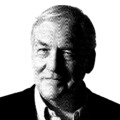I have been invited to reply to William Thorsell’s farrago of pathologically anti-American nonsense that appeared here in The Hub on May 29 under the title “We don’t have to go along with America’s catastrophic vision of the world forever.” I should write at the outset that I believe I have more reason than almost anyone in this country to have serious reservations about the United States. I do not especially like it as a society; its justice system is so corrupt that it does not, in my opinion, qualify as a society of laws and Canada should not have an extradition treaty with it. Along with its genius of showmanship, from the Declaration of Independence to the Super Bowl, there is almost always a gimcrack element of the country of which, in popular cultural terms, the capital is Hollywood. Its system throws up and often confers undeserved idolatry for a time upon unworthy people.
But we are discussing geopolitical matters and none of that is of the slightest account. The more important facts about the United States are that we owe chiefly to it the great spread of democracy and the market economy in the postwar world. It did the necessary to keep Britain and Canada in the Second World War and President Roosevelt was the chief architect of a strategy by which, as between the big three, the Soviet Union took more than 90 percent of the casualties in subduing Germany and between 1940 and 1945. France, Italy, Germany, and Japan transitioned from being hostile dictatorships, three of them at war with the West, to durable allies of the Anglo-Americans. Meanwhile, the USSR violated treaty obligations and plunged into the Cold War to take secondary strategic assets in Eastern Europe that it had to abandon. The United States strategy of containment led us to victory in the Cold War, without a shot being exchanged between the chief protagonists. The Soviet Union fell like a soufflé.
The United States is not a “hegemon” as Thorsell claims. If it was, it would have absorbed Canada long ago and many other places. All the United States has ever sought in foreign relations is not to be threatened. When it is threatened, it requires the removal of the threat. It has no rival in its own hemisphere, unlike the traditional European great powers where the correlation of forces was more or less equally divided between a number of countries and they had to tolerate each other.
Contrary to what Thorsell writes, the United States has no problem at all with other great powers in the world, as long as they do not threaten it. Like a vintage member of the nostalgic left, he imagines that America is unaware of the rising strength of China and that American capitalist influences are suborning the media and the academies to promote American unipolarity. It pains me to say this about an old and good friend, but a number of assertions in his piece are not entirely sane. He takes seriously Russian leader Vladimir Putin’s statement in Beijing last week that Russia and China will “work toward a more just and democratic…world order,” and promote “cultural and civilizational variety and the measured balance of interests of all members of the international community.”
Thorsell invites us to rely on Russia and China for the promotion of democracy and he imagines that the United States objects to cultural and civilizational variety. He crowns this astonishing triumph of self-brainwashing by requesting the Nobel prize for Vladimir Putin, head of the most overtly aggressive state in the world, who has invaded several of his neighbours and attempted to foment disorder through Russian-speaking minorities in several others.
Recommended for You

Ginny Roth: J.D. Vance, Pierre Poilievre, and how they slice their economic pie

David Polansky: As President Biden leaves the race, will the Democratic Party hodgepodge hold?

RCMP spending to protect MPs may have risen 112% since 2018, as Canadian politicians face greater rise in threats

Peter Menzies: The mainstream media should love Doug Ford, now that he’s subsidizing them












